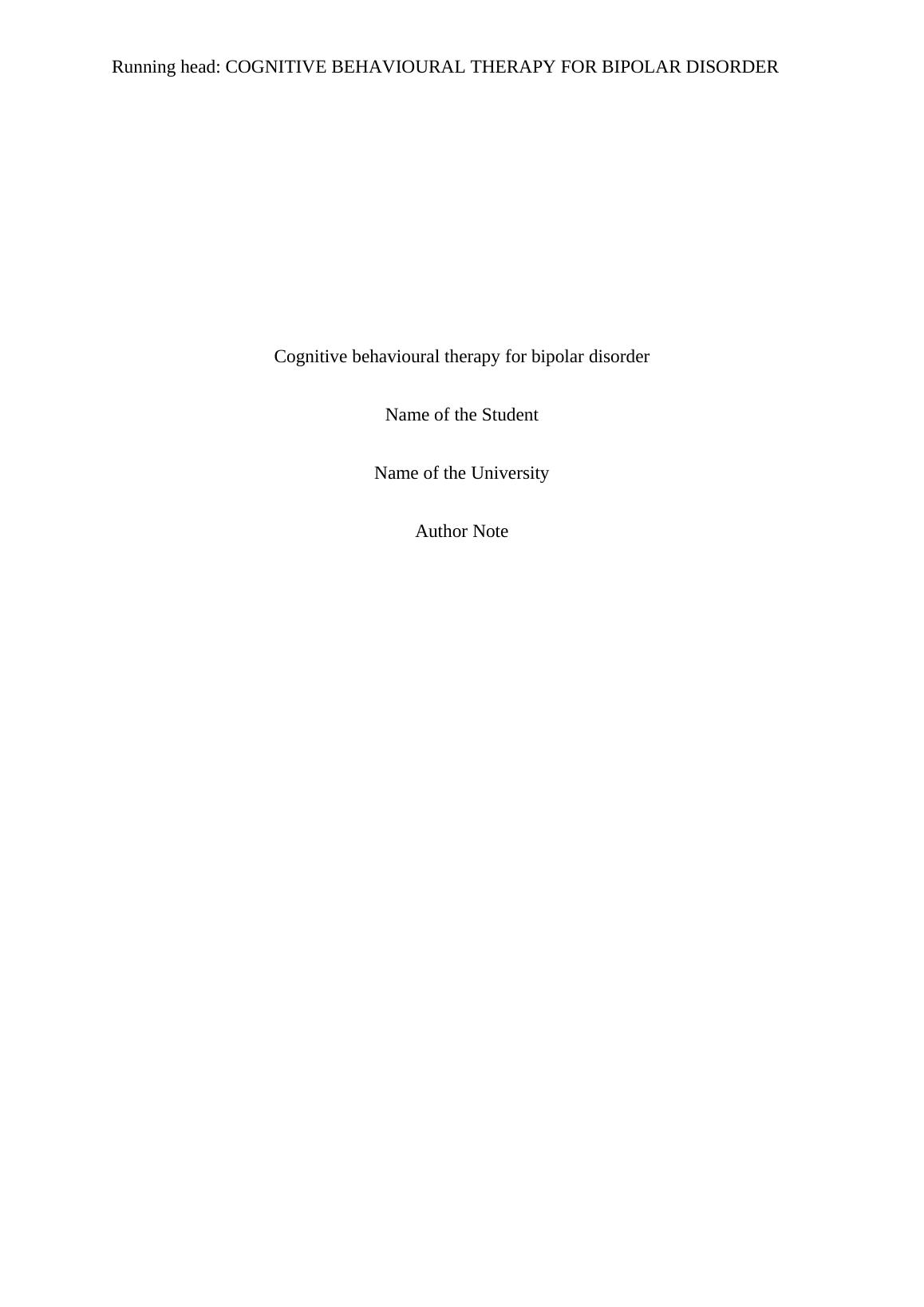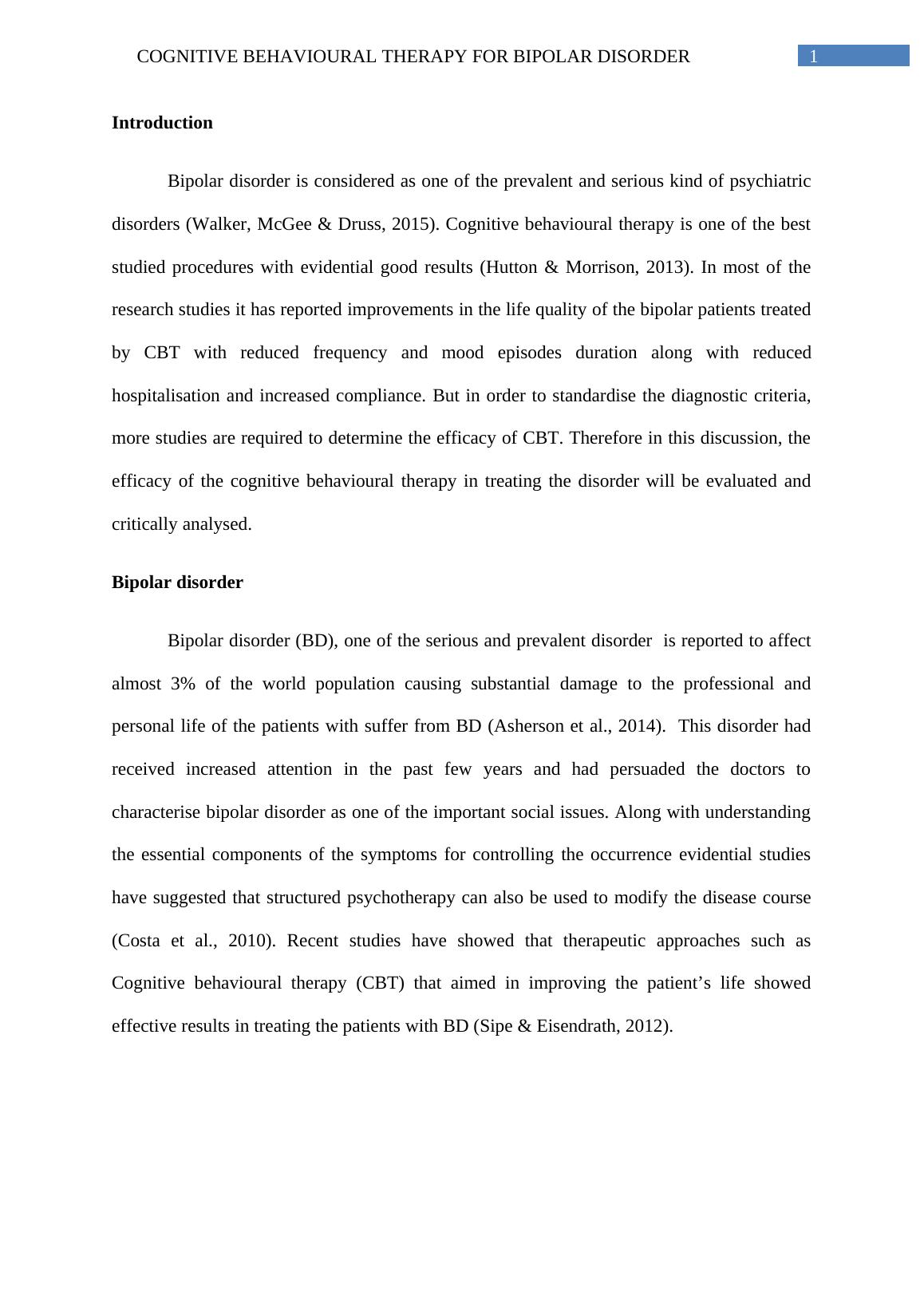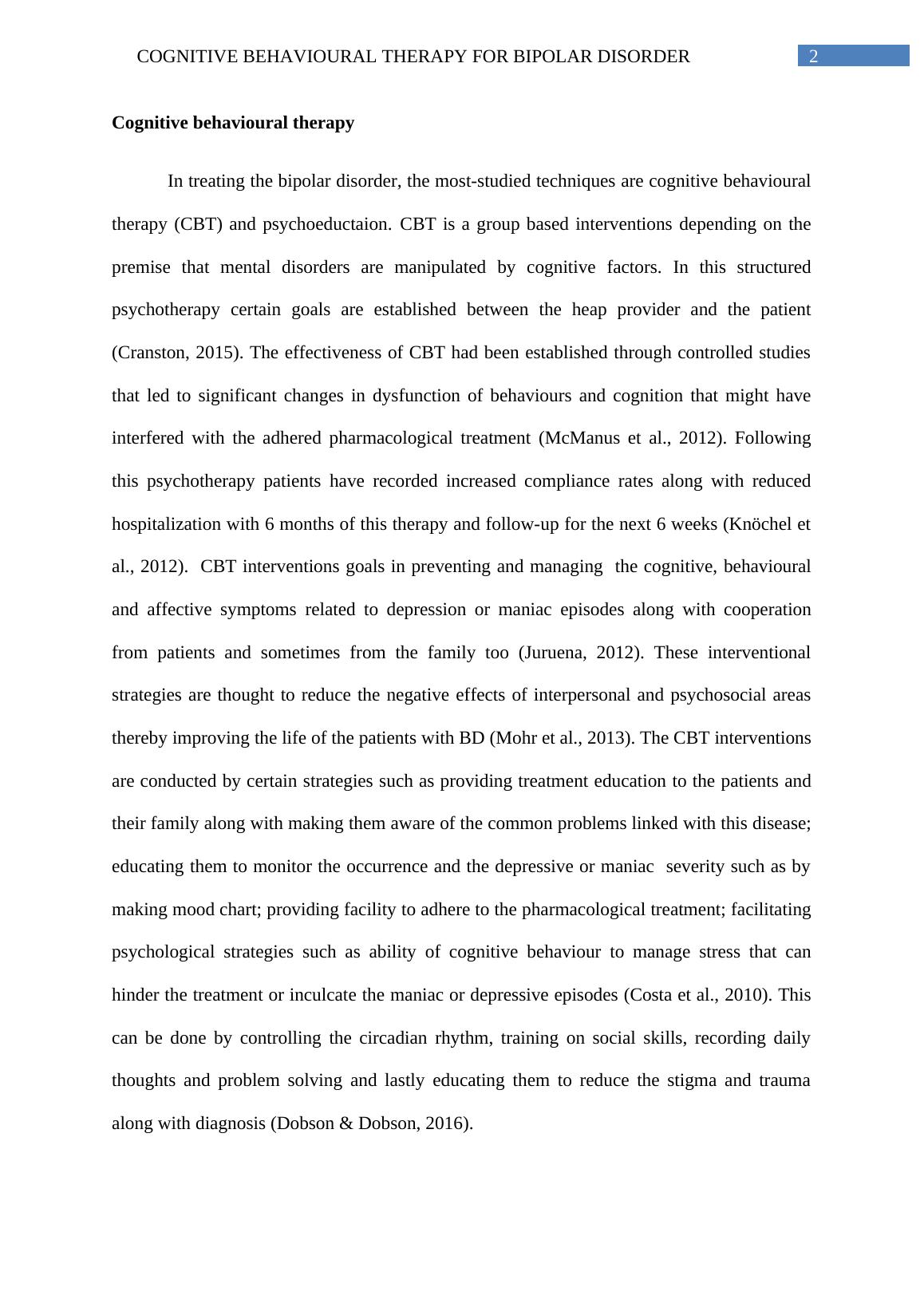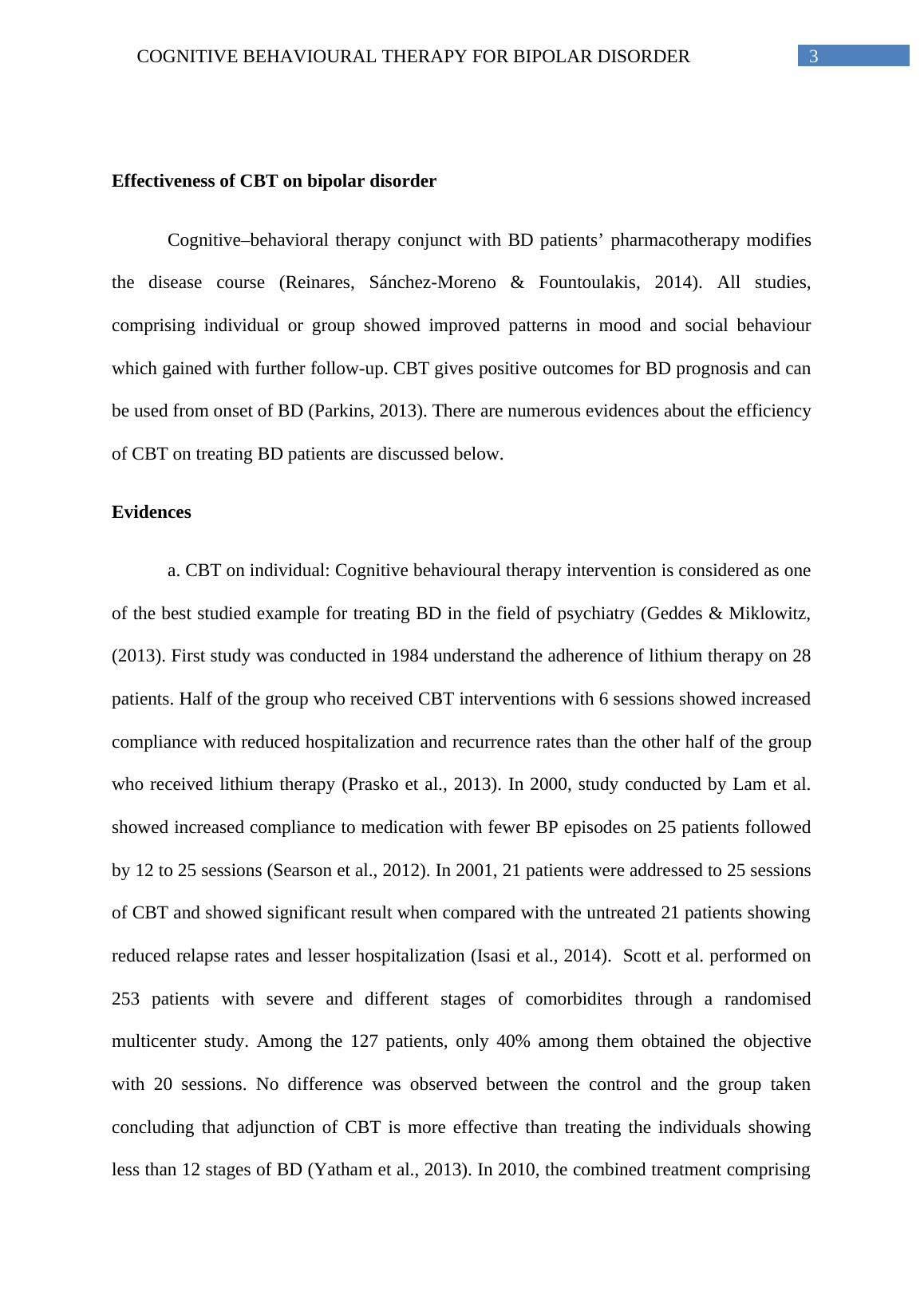Cognitive behavioural therapy for bipolar disorder
12 Pages3373 Words175 Views
Added on 2019-10-30
Cognitive behavioural therapy for bipolar disorder
Added on 2019-10-30
ShareRelated Documents
Running head: COGNITIVE BEHAVIOURAL THERAPY FOR BIPOLAR DISORDERCognitive behavioural therapy for bipolar disorder Name of the StudentName of the UniversityAuthor Note

1COGNITIVE BEHAVIOURAL THERAPY FOR BIPOLAR DISORDERIntroduction Bipolar disorder is considered as one of the prevalent and serious kind of psychiatricdisorders (Walker, McGee & Druss, 2015). Cognitive behavioural therapy is one of the beststudied procedures with evidential good results (Hutton & Morrison, 2013). In most of theresearch studies it has reported improvements in the life quality of the bipolar patients treatedby CBT with reduced frequency and mood episodes duration along with reducedhospitalisation and increased compliance. But in order to standardise the diagnostic criteria,more studies are required to determine the efficacy of CBT. Therefore in this discussion, theefficacy of the cognitive behavioural therapy in treating the disorder will be evaluated andcritically analysed. Bipolar disorderBipolar disorder (BD), one of the serious and prevalent disorder is reported to affectalmost 3% of the world population causing substantial damage to the professional andpersonal life of the patients with suffer from BD (Asherson et al., 2014). This disorder hadreceived increased attention in the past few years and had persuaded the doctors tocharacterise bipolar disorder as one of the important social issues. Along with understandingthe essential components of the symptoms for controlling the occurrence evidential studieshave suggested that structured psychotherapy can also be used to modify the disease course(Costa et al., 2010). Recent studies have showed that therapeutic approaches such asCognitive behavioural therapy (CBT) that aimed in improving the patient’s life showedeffective results in treating the patients with BD (Sipe & Eisendrath, 2012).

2COGNITIVE BEHAVIOURAL THERAPY FOR BIPOLAR DISORDERCognitive behavioural therapyIn treating the bipolar disorder, the most-studied techniques are cognitive behaviouraltherapy (CBT) and psychoeductaion.CBT is a group based interventions depending on thepremise that mental disorders are manipulated by cognitive factors. In this structuredpsychotherapy certain goals are established between the heap provider and the patient(Cranston, 2015). The effectiveness of CBT had been established through controlled studiesthat led to significant changes in dysfunction of behaviours and cognition that might haveinterfered with the adhered pharmacological treatment (McManus et al., 2012). Followingthis psychotherapy patients have recorded increased compliance rates along with reducedhospitalization with 6 months of this therapy and follow-up for the next 6 weeks (Knöchel etal., 2012). CBT interventions goals in preventing and managing the cognitive, behaviouraland affective symptoms related to depression or maniac episodes along with cooperationfrom patients and sometimes from the family too (Juruena, 2012). These interventionalstrategies are thought to reduce the negative effects of interpersonal and psychosocial areasthereby improving the life of the patients with BD (Mohr et al., 2013). The CBT interventionsare conducted by certain strategies such as providing treatment education to the patients andtheir family along with making them aware of the common problems linked with this disease;educating them to monitor the occurrence and the depressive or maniac severity such as bymaking mood chart; providing facility to adhere to the pharmacological treatment; facilitatingpsychological strategies such as ability of cognitive behaviour to manage stress that canhinder the treatment or inculcate the maniac or depressive episodes (Costa et al., 2010). Thiscan be done by controlling the circadian rhythm, training on social skills, recording dailythoughts and problem solving and lastly educating them to reduce the stigma and traumaalong with diagnosis (Dobson & Dobson, 2016).

3COGNITIVE BEHAVIOURAL THERAPY FOR BIPOLAR DISORDEREffectiveness of CBT on bipolar disorder Cognitive–behavioral therapy conjunct with BD patients’ pharmacotherapy modifiesthe disease course (Reinares, Sánchez-Moreno & Fountoulakis, 2014). All studies,comprising individual or group showed improved patterns in mood and social behaviourwhich gained with further follow-up. CBT gives positive outcomes for BD prognosis and canbe used from onset of BD (Parkins, 2013). There are numerous evidences about the efficiencyof CBT on treating BD patients are discussed below. Evidencesa. CBT on individual: Cognitive behavioural therapy intervention is considered as oneof the best studied example for treating BD in the field of psychiatry (Geddes & Miklowitz,(2013). First study was conducted in 1984 understand the adherence of lithium therapy on 28patients. Half of the group who received CBT interventions with 6 sessions showed increasedcompliance with reduced hospitalization and recurrence rates than the other half of the groupwho received lithium therapy (Prasko et al., 2013). In 2000, study conducted by Lam et al.showed increased compliance to medication with fewer BP episodes on 25 patients followedby 12 to 25 sessions (Searson et al., 2012). In 2001, 21 patients were addressed to 25 sessionsof CBT and showed significant result when compared with the untreated 21 patients showingreduced relapse rates and lesser hospitalization (Isasi et al., 2014). Scott et al. performed on253 patients with severe and different stages of comorbidites through a randomisedmulticenter study. Among the 127 patients, only 40% among them obtained the objectivewith 20 sessions. No difference was observed between the control and the group takenconcluding that adjunction of CBT is more effective than treating the individuals showingless than 12 stages of BD (Yatham et al., 2013). In 2010, the combined treatment comprising

End of preview
Want to access all the pages? Upload your documents or become a member.
Related Documents
Utility and Clinical Effectiveness of Cognitive Behavioural Therapy (CBT) in Treating Common Mental Disorderslg...
|12
|3383
|247
What is the evidence for psychological therapies other than Cognitive Behaviour Therapy in autism and cooccurring disorders?lg...
|34
|13725
|76
Assignment on Therapeutic Interventionslg...
|6
|1463
|22
Clinical Psychology IPT Research Paper 2022lg...
|11
|3239
|14
Table of Included Studies on Cognitive Behavioral Therapy and Pharmacotherapy for Depressionlg...
|4
|623
|371
Nursing Care and Recovery Plan for Bipolar Affective Disorderlg...
|21
|3449
|109
